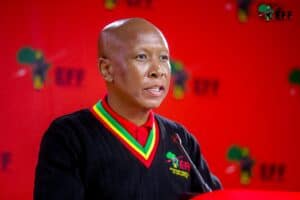The public protector's counsel insisted Mkhwebane had not relied on stolen emails in her report on the CR17 campaign, but they were handed to her.

President Cyril Ramaphosa had an obligation to disclose donations to his CR17 campaign, a duty imposed by a Constitutional Court judgment, according to arguments presented by counsel for the EFF, advocate Vincent Maleka SC.
Day two of proceedings in Ramaphosa’s review of Public Protector Busisiwe Mkhwebane’s report about CR17 campaign donations got under way with final submissions by the counsel for Mkhwebane, advocate Farzanah Karachi.
Karachi contended Mkhwebane had not relied on stolen evidence in the form of emails, from the heart of the CR17 campaign, that Ramaphosa accused her of obtaining illegally.
The emails, Karachi told the court, were handed to the public protector by an unknown source.
Meanwhile, Maleka urged the court to consider a ConCourt judgment from 2017, My Vote Counts against the justice minister and DA, which he submitted had created an ongoing obligation on Ramaphosa to declare.
Maleka argued that Ramaphosa, having designed the CR17 campaign in his own name with his own brand, benefited personally, having aspired to reach the highest office in the land, and then having attained it.
He said the moral virtues of what leaders were supposed to be, applied to all the political parties “regardless of their political fortunes”, adding the obligation to disclose, had “always existed”.
Ramaphosa argued the CR17 campaign had not benefited him personally but was a broader project to benefit the country and ANC, adding the benefit to him, other than becoming president, was indirect.
“A political campaign, including raising campaign funds from private sources, has a direct link … it will be artificial to divorce the affairs of the CR17 campaign … as if it had no impact on the … affairs of the country,” he said.
“The president was required to be open and accountable to Parliament.”
Advocate Steven Budlender SC, for the amaBhungane Centre for Investigative Journalism, argued if the court came to a finding that Ramaphosa had no duty to disclose the donations under the Executive Ethics Code, the court should declare the code invalid.
This would require it to be redrafted to include a provision on the declaration of donations or sponsorships of private political campaigns for positions within parties.
Budlender explained how the current code required declarations as follows: “If someone gives a deputy president, or premier or Cabinet member two bottles of wine, and the value is more than R350, he has to declare the gift. But [on the current Executive Ethics Code], if the deputy president, premier or Cabinet member is given R10m, R5m or even R1m, if it is for a part political purpose, he has no duty to declare it.”
AmaBhungane had approached the court, he said, to seek future relief.
Budlender argued Section 96 of the Constitution, read together with other sections, placed an obligation for a code guiding ethics in the executive to be drawn up, adding that code should comply with the Constitution which required open, democratic and accountable government.
“People need this information to make proper political choices,” he said.
For more news your way, download The Citizen’s app for iOS and Android.






